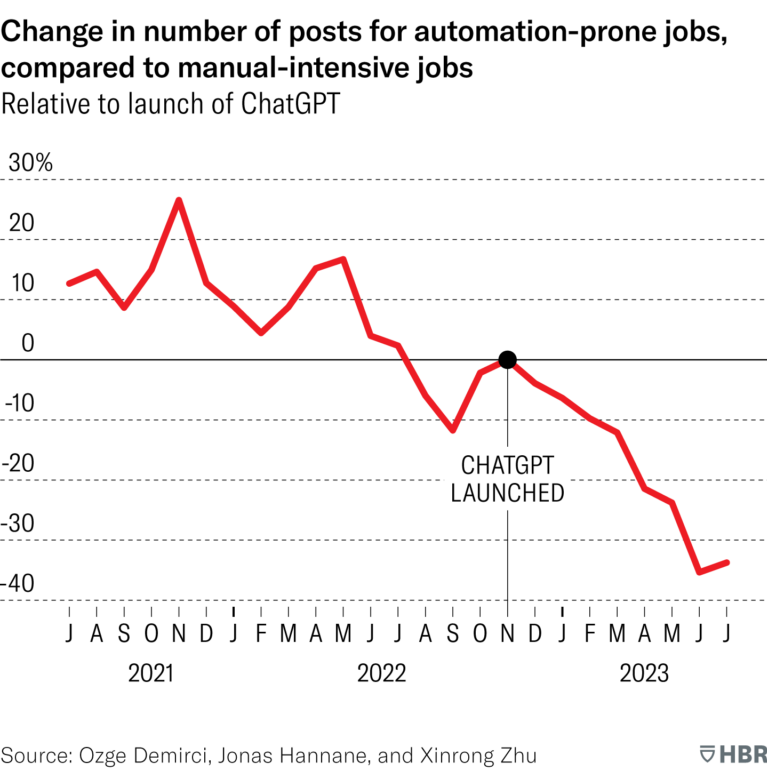A new study reveals a significant impact of ChatGPT on the freelance labor market, highlighting a marked decline in demand for jobs perceived as easily automated. The study, which will be featured in Management Science, analyzed 1.4 million job listings on a leading freelance platform from July 2021 to July 2023, according to Harvard Business Review. Findings show that demand for “automation-prone” jobs decreased by an average of 21% post-ChatGPT launch, significantly affecting automated roles rather than manual labor.

Freelance Writing Jobs Face Significant Decline
The decline in demand is most pronounced in freelance writing positions, which experienced a staggering drop of 30.37%. Software and web developers saw a decrease of 20.62%, while engineering roles fell by 10.42%. This trend highlights the vulnerability of positions that are easily outsourced to AI solutions.
Furthermore, the rise of AI image generators such as Midjourney and DALL-E has adversely affected job listings for graphic designers and 3D modelers, with a 17.01% decline relative to manual-intensive jobs. The study indicates this trend shows no signs of recovery within the job market.
Generative AI’s Stronger Impact on Employment
The researchers emphasize that the effects of generative AI are substantially more profound than previous automation waves. For instance, when French industries ramped up robotics by 20%, employment only declined by 3.2%. The unique capability of generative AI to continuously improve sets it apart from traditional automation technologies, influencing virtually every industry.
Increased Competition and Elevated Requirements
As the job market contracts, competition for available positions intensifies. Post-ChatGPT, the number of applications for automatable jobs surged by 8.57% per posting, along with a 2.18% increase in the number of required skills and a 5.71% increase in client budgets. Industries actively leveraging AI tools like ChatGPT experienced the most significant job losses. In contrast, manual roles like audio and video editing remain largely insulated from these changes.
Emerging Opportunities Amid Declines
While traditional freelance roles may be diminishing, the evolution of AI introduces new opportunities for job seekers. Notably, the number of job listings requiring ChatGPT skills has risen consistently, with an average increase of 0.68 listings per week since its launch. The study identified 903 such listings, with 88% in automatable tasks and 82% within software and web development sectors.
Addressing the Gender Gap in AI Utilization
The study also revealed a concerning gender disparity, revealing that women are significantly less likely to utilize ChatGPT in their work compared to their male counterparts in similar roles. To combat this issue, researchers recommend that companies prioritize training initiatives for low-skilled workers in AI tools, as this demographic has the greatest potential for productivity improvement.
Future of Work in the Age of AI
As AI continues to take over more routine tasks, managers will need to develop new competencies focused on effective task delegation to both human and machine capabilities. The goal is to optimize the strengths of both to enhance overall productivity. The research emphasizes a strategic approach to incorporating AI tools, ensuring that workers adapt to the evolving landscape while enhancing their decision-making and judgment skills.
Impact of AI on the Freelance Job Market
A recent study highlights the significant influence of ChatGPT on the freelance job landscape, revealing a notable decline in demand for jobs considered easily automatable. Published in Management Science, the research analyzed 1.4 million job listings from a prominent freelance platform between July 2021 and July 2023.
Declining Demand for Automatable Jobs
The findings indicate that demand for “automation-prone” roles fell by an average of 21% following the launch of ChatGPT. This trend is contrasted with jobs that require more manual intervention, which experienced relatively stable demand levels.
Writers and Developers Hit Hardest
Freelance writing positions suffered the most, with job postings decreasing by 30.37%. Software and web development roles faced a decline of 20.62%. Engineering positions also experienced a drop, albeit smaller, at 10.42%. These significant decreases reflect broader changes in the market as AI tools become more prevalent.
The Visual Impact of AI on Graphic Design
Further extending its impact, the introduction of AI image generators like Midjourney and Stable Diffusion led to a 17.01% decrease in job listings for graphic designers and 3D modelers compared to manual-intensive roles. Despite the emergence of these technologies, there appears to be no recovery in the job market for these creative positions.
The Undeniable Strength of Current Trends
Researchers emphasize that the effects of AI on job availability are remarkably more intense than past automation waves. For context, a 20% increase in robot utilization in French industries only resulted in a 3.2% employment drop. The study asserts that generative AI is different from previous technologies, with its capacity for continuous improvement meaning it could ultimately influence virtually every sector of employment.
Increasing Competition in the Job Market
As the freelance job market contracts, competition for remaining roles intensifies. After ChatGPT’s introduction, applications per job posting in automatable fields rose by 8.57%. Moreover, the necessary skill sets demanded by employers have also increased by 2.18%, alongside a 5.71% rise in client budgets.
Rising Need for AI Skillsets
Despite the decline in traditional freelance opportunities, new roles emphasizing AI competency are emerging. The number of job listings requiring ChatGPT skills has grown by 0.68 positions per week since the chatbot’s launch. Notably, 903 job listings specifically requested ChatGPT expertise, highlighting a shift in job requirements, especially within the fields of software and web development.
Addressing Gender Gaps and Future Recommendations
The study also uncovers a significant gender gap, with women less likely to use ChatGPT in their job functions compared to men. In light of these findings, researchers recommend that organizations focus on training low-skilled workers in AI tools, as this demographic stands to benefit the most from productivity enhancements. As AI continues to evolve, the expectation is that work will increasingly shift towards tasks demanding human judgment and decision-making skills.
The authors suggest that managers should cultivate new competencies, particularly in AI task delegation, to effectively navigate the changing landscape of work. This holistic approach aims to maximize the unique strengths of both human and machine capabilities.


